Teacher and School De-Escalation Training & Techniques and OVA training For Teachers
AGKK de-escalation training provides Proven, Practical Training for Teachers and Lecturers in OVA Training for Educators in Schools and Universities
What is Workplace violence and aggression in a school, university, business or organisation?
Workplace violence and aggression is when a person is abused, threatened or assaulted at the workplace or while they’re working.
It is serious and can cause both physical and psychological harm, making it a risk to health and safety.
Under the model WHS laws is Australia, persons conducting a business or undertaking (PCBUs) must manage the health and safety risks of workplace violence and aggression between workers and from other people, at the workplace, like customers, students and clients.
Teacher de-escalation training violence and aggression management of school students OVA training courses & workshops
A proven intervention is the use of AGKK de-escalation techniques and trainings for educational entities (e.g., administrators, counsellors, school resource officers, and teachers) to mitigate the impact of student or peer aggression and promote the safety of the school environment. We provide practical face-to-face de-escalation training that provides real world de-escalation solutions for teachers that work.
Across a variety of professional fields, such as public health and education, de-escalation training involves learning strategies for the prevention and the management of aggression and violence.
De-escalation may include training in early intervention practices, communication methods (i.e., verbal and non-verbal styles), appropriate responses in potentially violent situations, and the correct use a safe disengagement solutions. The training is intended to reduce conflict, aggression, and harm.
In an educational setting, de- escalation can be defined as a range of interconnected interventions that include verbal and non-verbal communication, self-regulation assessment, and actions taken while maintaining the safety of teacher the in the school or university.
![]()
CONTACT US ANYTIME – 7 DAYS PER WEEK
We welcome all schools, universities & organisations with our de-escalation training
We are always supportive with our custom-made de-escalation training.
CONTACT US TODAY
You are welcome to phone Bernie Directly on 0409474494 or use this inquiry booking form
We are here to assist you with your inquiry booking today!
Have a question or require further information?
Training in AGKK de-escalation workshops will provide your organisation and your staff the foundations for safer aggression management and prevention of violence in the workplace.
ADVANCED BOOKINGS RECOMMENDED
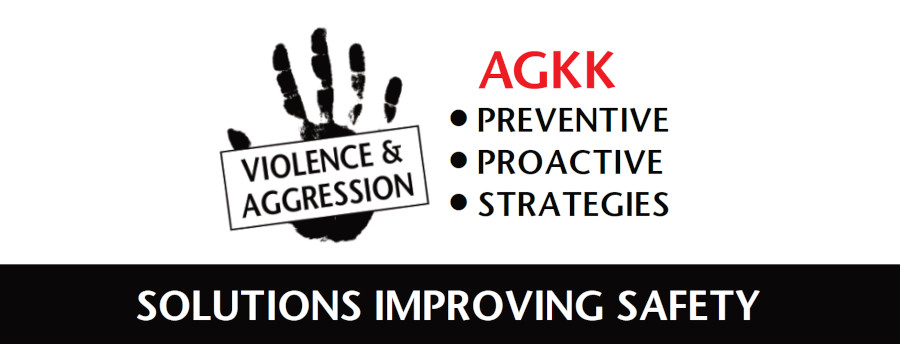
Teacher de-escalation training reduces the anxiety of staff
In our AGKK de-escalation training we assist schools, universities teachers and lectures create a safe environment where positive rather than negative measures form the basis of behaviour management programs;
🎯 In our de-escalation training we teach staff how to avoid taking conflict personally and avoid power struggles;
🎯 The OVA training helps prevent problem behaviours through a system of recognition of signs of anxiety and distress in students and staff;
🎯 Identify the phases of crisis events and match behaviours to interventions;
🎯 Demonstrate and model de-escalation techniques and other safety strategy alternatives;
🎯 Develop and use positive reinforcement and other positive techniques to shape replacement behaviour(s);
🎯 Consider and utilize research-based practices that develop and maintain replacement behaviours that enhance student learning and skills for life.
Evidence-Informed Components of De- Escalation Training:
Interpersonal Characteristics of Effective De-Escalators
Examples include
🎯 Open to listen
🎯 Honest (only making promises or agreements that can be kept)
🎯 Supportive
🎯Non-Judgmental
🎯Confident (e.g., without becoming arrogant)
🎯Genuine (e.g., able to show authentic concern for the aggressor)
🎯Ability to appear non-threatening
🎯Empathetic (e.g., ability to understand the concerns of the aggressor, which can help the
student to feel understood)
🎯Self-Aware (ability to be aware of and self- regulate one’s feelings of anger, fear, or anxiety while remaining outwardly calm)
Communication: Verbal and Non-Verbal Skills-
🎯Use a calm and gentle tone of voice
🎯Speak slowly
🎯Respond with tactful language (avoid jargon or making threats)
🎯Monitor one’s body language (e.g., facial expressions, posture, avoid sudden movements toward the aggressor)
🎯Make and maintain eye contact with the aggressor
🎯Offer the aggressor personal space
🎯Use active listening techniques
🎯Remain aware of how differences in culture may impact verbal and nonverbal communication
🎯Teachers can allow for moments of silence to allow time for the aggressor to think and respond possibly more calmly
Teachers should Know When to Intervene and use the de-escalation strategies-
Early intervention is key to successfully de- escalate a situation
🔴 An accurate assessment of an individual’s or student’s emotional state can be made by active listening, empathy, and awareness and interpretation of non-verbal cues
🔴 Making the decision regarding what strategy to use for de-escalation requires instinctive and flexible approaches that are based on the unique needs and characteristics of the aggressive student (i.e., not every strategy will be appropriate with each student)
🔴 Unnecessary interventions may escalate rather than de-escalate the situation (e.g., a teacher yelling at a student)
🔴 Consider the following for deciding when and how to intervene:
✅ Knowledge of the student
✅ Meaning of the behaviour
✅ Dangerousness of the behaviour
✅ Impact of the behaviour on others
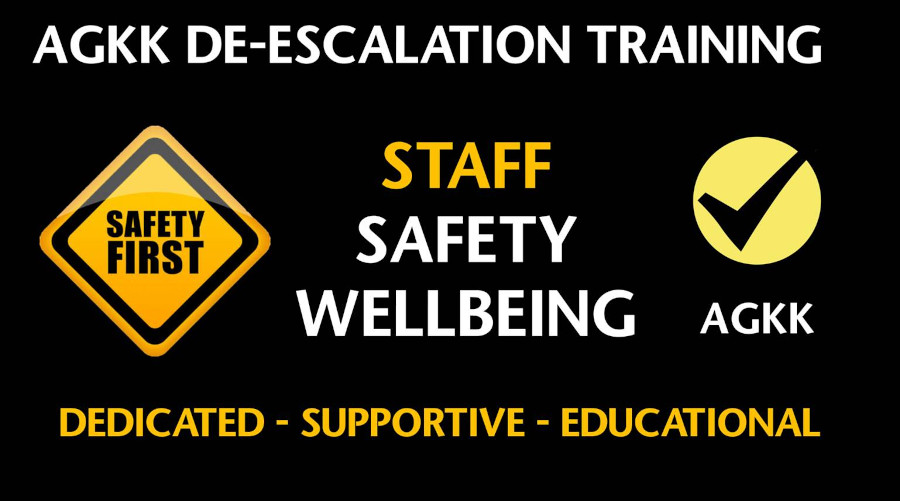
Teachers should Know How to Safely Engage with the Aggressor-
• In our de-escalation training we train teachers to establish a rapport or a bond with the student displaying aggression
• We educate teachers to match the posture of the student (i.e., stand if the student is standing and sit if the aggressor is sitting)
• While building a rapport with the aggressor, continue to assess the student for risk of violence. Be aware of potential weapons or other dangers
• Offer a change of activity or a different place to go to help the aggressor self-regulate his or her emotions
• Use distraction or attempt to redirect the aggressor’s attention
• Recognize the cause of the student’s agitation (e.g., if another student is disturbing or exciting the aggressor, remove that student from the room)
• If a behaviour plan is already in place for addressing aggressive behaviours, be aware of and use those interventions to guide your selection of the most appropriate response to the aggressor’s behaviour
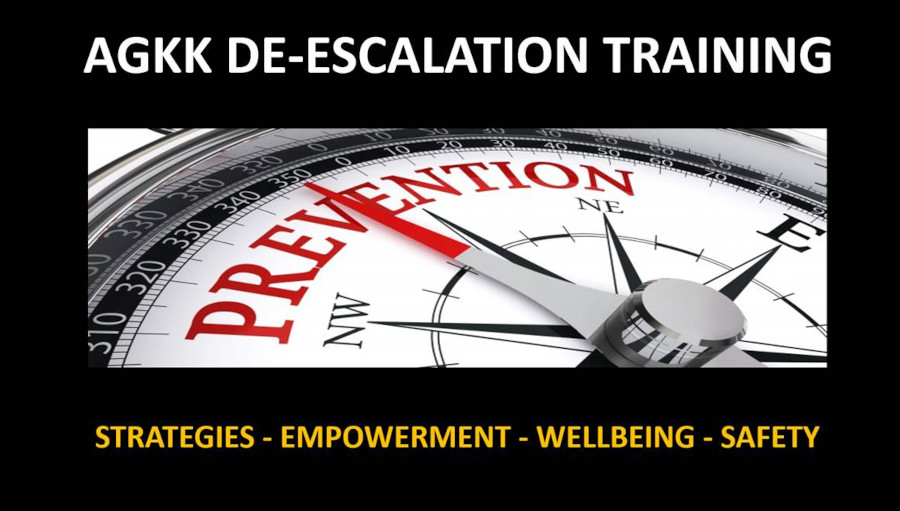
Teacher Safety Considerations when dealing with aggressive individuals or students
As teachers we all need to assess the level of staff support needed to safely de-escalate an aggressive or violent student. Forward planning is important to improve safety; teachers should know whom may be available to provide help, and seek assistance if needed. Teachers should call for assistance if the student poses an imminent threat to his or herself or others at school or at university.
• Assess the area for dangers and a safe exit (e.g., potential weapons, exits for staff and students to leave safely if necessary)
• If it is appropriate, teaching could encourage the aggressor to move to a quiet area away from other students and uninvolved staff
Teacher de-escalation training improves the safety, wellbeing and confidence of all staff
🎯 In our de-escalation we teach staff positive and supportive strategies that provide immediate solutions
🎯 Any de-escalation intervention must be aligned with the level of risk presented by the student to teachers oneself and other students
🎯One strategy is to include the student in trying to develop a workable solution to the situation or incident
🎯We reinforce that it is important to debrief the victim following an incident to identify strategies for de- escalation that may prove useful in future crises
IMPROVING TEACHER CONFIDENCE, SAFETY, WELLBEING OF STAFF WITH PRACTICAL DE-ESCALATION TRAINING
“Creating a safe environment where all students can learn and succeed academically is vital to the success in all schools.
AGKK practical, face-to-face de-escalation training for teachers and lecturers helps create a safer school and university environment for teachers and students.
In today’s university lecture rooms, school classroom’s teachers need de-escalation training to improve confidence and maintain safety and wellbeing.
It is important that teachers have the necessary de-escalation skills in the effective management of challenging students, distressed or hostile parents, and difficult situations with co-workers and many situations.”
These proven and practical de-escalation training techniques for teachers will only increase the ability of educators to actually teach instead of wasting the majority of their time having to “put out the chain reaction of classroom or school fireworks” and navigate through crisis workplace conflict situations with violence and aggression.
Whether it is de-escalation strategies for teachers, de-escalation techniques for primary or high school students and university students, learning effective methods to preventing school crisis situations, and recognizing warning signs early on in the occupational violence and aggressive cycle are the keys to successful safer outcomes.
Our school and teacher de-escalation training presents numerous strategies for educators, teacher’s aids, and other related professionals to be able to connect, engage, and prevent school workplace conflict situations from occurring. We conduct de-escalation training in schools and universities across Australia. These de-escalation foundational skills, comprised of real world practical strategies in our face-to-face workshops and courses will increase confidence and enhance the ability of teachers and all staff to successfully manage difficult aggressive or violent encounters with students, parents, co-workers and all individuals.
De-escalation Training and OVA training In Schools and Universities
De-escalation training workshops, courses and programs are designed and tailor-made in response to the requirements of individual schools, universities and workplaces. De-escalation training workshops can range from two hour intensive practical training sessions, to practical interactive workshops of half, full or multiple days in length. AGKK de-escalation training and OVA training is flexible to accommodate your staff needs with this valuable de-escalation information and specific practical teaching strategies.

De-escalation Training for teachers and lecturers
This practical, solution based OVA training looks at de-escalation strategies for teachers, the stages of conflict escalation and how to prevent conflicts from escalating.
What is De-escalation in schools are why is de-escalation important for teachers & students?
De-escalation refers to the process of diffusing conflicts as they begin to prevent them from getting worse or potentially violent. In regards to classroom and playground management, there are strategies that teachers can use to de-escalate conflicts in their earliest stages and stop small behavioural issues before they get out of hand. These usually involve identifying a risk and intervening as quickly as possible in a calm and strategically controlled, safe manner.
De-escalation training and OVA training improves the safety and wellbeing of staff and students.
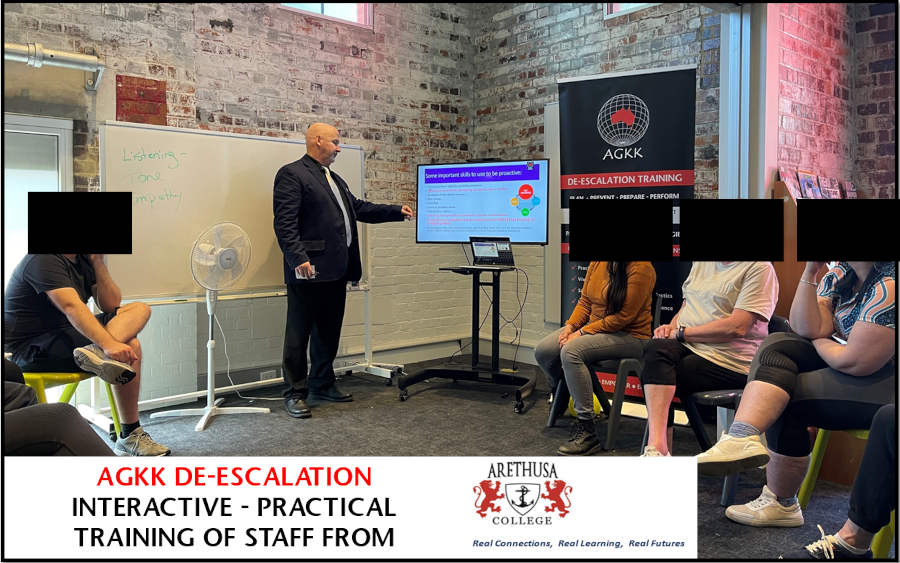
Some Objectives of Teacher and Lecturer De-escalation training
✅ Identify and discuss and how de-escalation training can be beneficial.
✅ Provide de-escalation and deflection techniques.
✅ Demonstrate how classroom situations in which de- escalation skills are utilised successfully.
✅ Role play and discuss best courses of action using de-escalation strategies and techniques
✅ Demonstrating strategic de-escalation training calming communication techniques to diffuse, redirect, or de-escalate a conflict situation safely.
Deflection Techniques Communication techniques –
Example proactive statements –
Deflection Techniques Communication techniques –
Example proactive statements –
✅ “I appreciate that…but…”
✅ “I’m sorry you feel that way…but…”
✅ “I understand how you feel…but…”
✅ “That may be true…however…”
In our de-escalation training we educate teachers how to manage and respond to occupational violence and aggression
🔴 As teachers, we must maintain a professional, calm demeanour and steady, level voice, even in the face of intense verbal disrespect or threats from the student.
IN OUR DE-ESCALATION TRAINING WE TEACH AND EDUCATE STAFF TO-
✅ Speak softly and slowly; step back and try to see the situation from the student’s perspective.
✅ Speak respectfully to the student.
✅ Strive to appear calm even if you are upset or anxious.
✅ Avoid the use of sarcasm, teasing, reprimands, or other negative comments.
Three important De-Escalation Techniques (The Three “C’s”)
🎯 Confident
🎯 Calm
🎯 Create space
We teach practical De-Escalation Techniques that work for teachers and staff
🔴 Speaks slowly.
🔴 Lower your voice.
🔴 Avoid staring.
🔴 Avoid arguing or being confrontational.
🔴Show concern through your verbal and physical responses.
🔴 Be prepared to escape to safety
De-Escalating training for teacher, school student or university student conflicts
The Five “R” de-escalation techniques that are effective in schools and universities
🎯RECEIVE the comments from the student without interruption and do not become defensive.
🎯 REPEAT the comments of the student as objectively as possible.
🎯REQUEST the student provide a way of dealing with the problem.
🎯REVIEW the options and decide on the best approach.
🎯RESPECT the student even if you disagree.
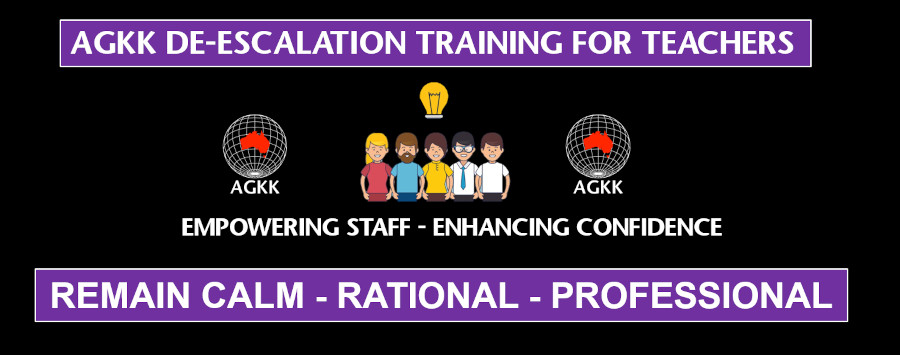
In our de-escalation training for teachers we educate staff in Readiness to Respond Skills
🔴 Use calming posture.
🔴Keep hands open and visible to the student.
🔴Show open and non-threatening body language. Stand at an angle instead of facing the student directly.
🔴 Avoid strong body language such as crossing arms or making hands into fists.
In our de-escalation training we educate staff safety in always first.
If Teachers Cannot defuse a very aggressive or violent Situation they should seek help immediately.
🔴 Do not hesitate to seek assistance from other teachers, principals, counsellors, or administrators immediately.
🔴 If the student becomes violent, protect yourself and others from the assault and subsequently follow the reporting policy required by your school.
![]()
TAILOR-MADE PRACTICAL DE-ESCALATION TRAINING FOR TEACHERS, WORKSHOPS AND COURSES
The tailor-made de-escalation training provides teachers with an effective foundational framework for proactive de-escalation.
The interactive de-escalation training provides schools, organisations, teachers and individuals the skills and resources needed for optimal de-escalation to prevent many Occupational Violence and Aggression incidents from occurring.
![]()
DELIVERY
OF DE-ESCALATION TRAINING WORKSHOPS AND COURSES:
Usually our custom made interactive de-escalation training is delivered in person, at your school, university, organisation or venue.
![]()
LOCATIONS
OF DE-ESCALATION TEACHER TRAINING WORKSHOPS AND COURSES:
Training Australia Wide.
Usually conducted at your school/ university workplace or another location.
![]()
TARGET AUDIENCE
OF DE-ESCALATION TRAINING WORKSHOPS AND COURSES:
All teachers, staff and managers facing workplace aggression, conflict or violence.
![]()
TRAINING GROUP SIZE /CAPACITY
OF TEACHER DE-ESCALATION TRAINING WORKSHOPS AND COURSES:
Can be up to 50 people for each training de-escalation workshop.
(We are flexible to accommodate your needs)
![]()
COST
OF DE-ESCALATION TRAINING WORKSHOPS AND COURSES:
Upon request and to be discussed based on your needs and training requirements.
TOUCH BASE ON THE PHONE TO FAST TRACK YOUR REQUIRED SAFETY OUTCOMES
It is important to touch base on the phone so are able to fast track and establish your specific training requirements and desired outcomes for your staff and business
Phone Bernie 7 days per week on 0409 474 494 or use this inquiry booking form
I am passionate and dedicated I trust that my experience and practical proven performance assists your business and staff.
![]()
DURATION
Tailor-made de-escalation practical training, courses and programs can be
🔴 2 hour intensive interactive workshop
🔴 Half Day interactive Training or
🔴 Full Day interactive training for workplaces and teachers, staff, businesses and other organisations.
These de-escalation workshops and courses can be adapted to fit with your school, university and organisations timeframe.
It will meet your specific training requirements and desired practical outcomes.
Advanced Bookings Recommended
![]()
We can travel to your location Australia wide
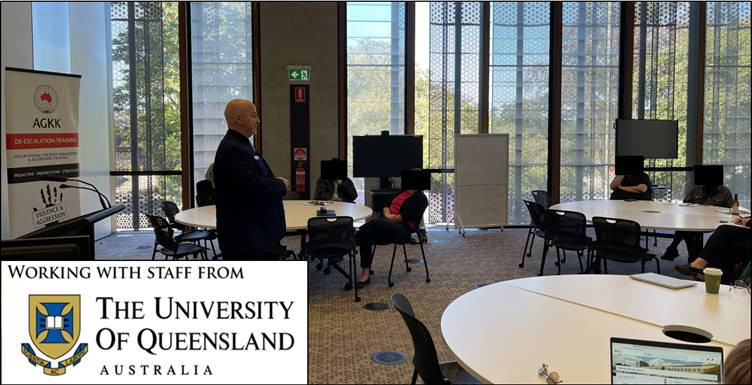
De-escalation Strategies in the Classroom, Lecture rooms, Schools and Universities
We teach practical de-escalate skills for teachers that support them with conflicts with students to create more positive choices when it comes to behaviour.
In our de-escalation training and OVA training we educate staff to stay calm and use effective non-verbal communication, most conflicts can be prevented before they gain momentum. By using de-escalation techniques these issues can be managed effectively.
AGKK de-escalation training helps for calmness and positive learning in teacher’s classrooms.
The following de-escalation strategies can be used by teachers in the classroom.
At AGKK de-escalation training we improve:
- Active Listening. Acknowledge the opinion of the other person and their feelings towards the situation (e.g. I understand why that would be frustrating). Teachers should communicate openly to assist students so they can see that you are on their side. This will help the teacher and student work together towards a solution instead of fighting against each other.
- Teachers will learn to skills to Stay Calm (even if they are not). This will help the student feel less threatened and more likely to communicate with teachers. Keep your control and model respectful behaviour towards your student. It also helps to try and keep a friendly tone and lighten the situation with humor where appropriate.
- Teachers should Offer Positive Choices. Instead of telling a student what to do, or trying to force them to behave in a certain way, try giving them a few different options to choose from. This will prevent the student from feeling powerless or unheard and help direct them towards displaying desirable classroom behaviour.
- Ask Questions. Perhaps the student is struggling with something you can help with, or needs something in order to focus. If you ask a student what you can do to help them focus, they may surprise you with some practical solutions.
- Choose your battles wisely. If something doesn’t need to be a big deal, don’t turn it into one. Consider how important an issue is in the grand scheme of things and don’t sweat the small stuff, especially if it could escalate into a much bigger problem.
- Use non-threatening body language. Try using your proximity in the classroom to correct bad behaviour without saying a single word. Using simple hand gestures, such as tapping lightly on a desk or placing a finger to your lips can be much more effective than more aggressive approaches, like raising your voice.
Teacher and Staff De-Escalating Conflict Techniques
Any teacher or staff member in a school or university community could suddenly be in a situation that is erupting out of control. As a teacher or staff member you can be in a position and can feel the tension and you are fearful of what might happen next.
Imagine as a teacher or staff member the difference if you had a strategic toolkit of workplace conflict de-escalation techniques at hand. After our de-escalation workshop training teachers and staff members have more confidence and more in control.
We train staff and teachers with practical strategies that are easy to implement and solutions.
In our de-escalation training for teachers, we teach staff to remain and appear calm and stay safe.
Teacher Classroom De-escalation Strategies that work. In our de-escalation training we train and teach staff and teachers to:
- Always respond to threats. If a student threatens violence towards someone else, it’s important to always speak to the student. Discuss with the student ways they could express their anger without affecting the safety of others.
- Be empathetic and nonjudgmental. Whether or not you believe a student’s feelings are justified, do not judge or dismiss them. The root of the student’s distress might lie outside the classroom and a little support and encouragement can go a long way.
- Show open, accepting body language. Stand at an angle rather than facing the student directly to reduce the feeling of confrontation. You should also avoid crossing your arms or clenching your fists. Instead, keep hands open and visible to the student.
- Provide adequate space. Try to stay at least two arm’s-length away from the student. If the student tells you to back up or move, give them additional space.
- Create a safe space. Defuse the situation by respecting and reassuring the student. This could be as simple as letting them know they are not in trouble. If possible, try to have a semi-private conversation with them, rather than engaging with the student in front of their classmates. Keep in mind adults should never be left alone with an agitated student.
- Limit the number of adults involved. Having too many authority figures could intimidate the student or create confusion and mixed messaging.
- Redirect their thoughts. If a student is acting violently, try to de-escalate the situation by speaking softly, using “you” statements and acknowledging the student’s anger. Attempt to distract the student by asking them about something they enjoy.
- Be assertive but not aggressive. Do not argue with or respond to challenges of authority or verbal threats and abuse. While it’s natural to feel defensive or anxious, never threaten a student verbally or physically. It’s important you appear and sound calm.
- Find Common Ground. Use active listening to identify the student’s wants and needs. Then, rephrase them and build rapport by identifying authentic points of agreement. For example, you could say, “I can understand why you were upset about what happened at recess. I would be too.”
- Use simple, direct language. Keep your sentences simple and brief. And give the student time to comprehend and respond before continuing. You may need to use gentle repetition to get your message to “stick.”
- Send for help. If efforts to calm the student down do not work, move the other students out of the classroom and send for help. If possible, wait for help with the student.
- Report the incident. If a violent incident does occur, report the incident immediately to school administrators.
The goal of proactive de-escalation is to build rapid rapport and a sense of connectedness with an agitated person or student in order to reduce the likelihood of aggression or violence.
In our de-escalation training we reinforce that when there are signs of anger or verbal aggression it is important to remember that teachers
- need to stay calm
- anger may be a sign that the person is in distress, experiencing fear or frustrated
- it is not possible to reason or problem solve with someone who is enraged
- Teacher and staff effective communication skills are the key to settling, resolving and de-escalating a situation.
AGKK de-escalation workshops help teachers, staff members and individuals control their own behaviour during heightened stressful situations in schools, universities and classrooms.
There are some key de-escalation strategies that teachers and staff can use include:
- Understand that Behaviour is Communication: Most communication occurs beyond the words we use. Look for signs of anxiety in body language, tone and cadence. Understand that crisis behaviour reflects a need and consider what it is the other person might want.
- Avoid the Power Struggle: No one can meet every need at every moment. Challenging or exercising authority over a person can escalate negative behaviours. Considering options you can offer allows flexibility to address both parties’ needs and desired outcomes.
- Use Limit Setting: Behaviour can’t be forced but setting limits can help us influence behaviours. Framing acceptable behaviours or outcomes can encourage the other person to choose the most productive option.
- Practice Rational Detachment: Don’t take behaviours personally. Stay calm. Find a positive way to release the negative energy you absorbed during the conflict. Keep in mind, you can only control your own attitude and actions.
- Therapeutic Rapport: Learn from the conflict and help the other person learn from the experience. Focus on identifying and preventing the pattern of behaviour in the future. Finally, put time and effort into repairing the relationship.
AGKK de-escalation training has found that stress, fear and anxiety can impact the health and wellbeing both short- and long-term. When pressed, these scenarios can cause students and people’s reactions to escalate and lead to verbal and even physical conflict. This is why AGKK de-escalation training instils key strategies to provide effective solutions and management skills for violence prevention and aggression management.
In our de-escalation training teaches and all staff members can obtain the skills to avoid escalating situations with others. The most important thing to remember is that behaviour influences behaviour and one’s actions and attitudes impact the actions and attitudes of those around them.
Teacher and School De-Escalation Training & Techniques and OVA training For Teachers
At AGKK de-escalation training we are committed to the best proactive practices and safe behaviour management methods that focus on prevention and strategic management of occupational violence and aggression.
We help create more confident and productive teachers, staff and employees.
AGKK De-Escalation Training provides practical solutions for occupational violence and aggression management.
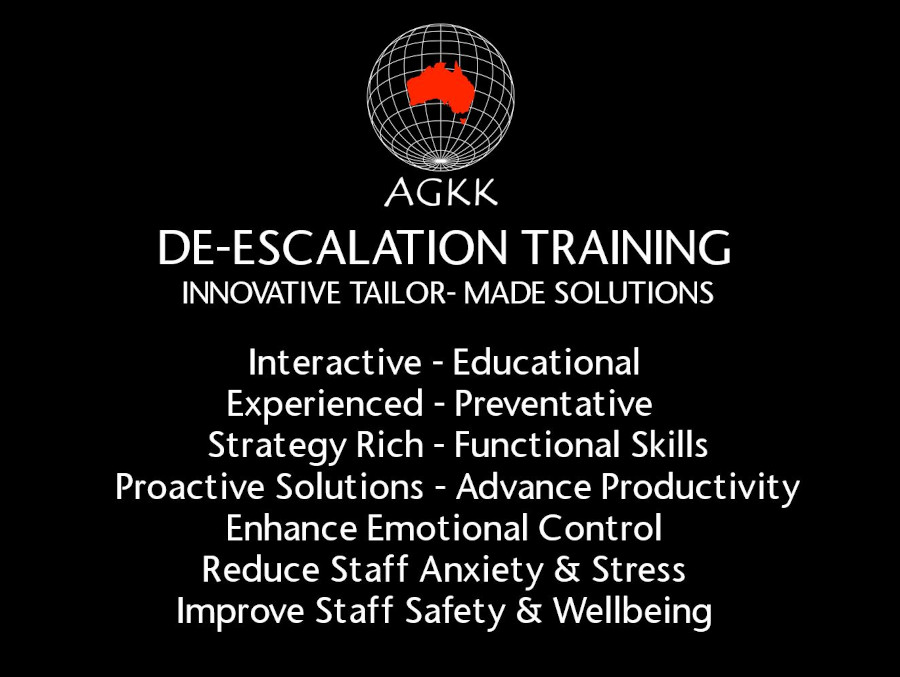
![]()
CONTACT US ANYTIME – 7 DAYS PER WEEK
Directly on ☎ 0409474494 or use this inquiry booking form
You are most welcome to contact Bernie to discuss your specific objectives and desired outcomes for Teacher De-escalation training, courses, programs, OVA training, Violence management prevention training,
Aggressive Behaviour Management, Risk Management training and Staff Safety Self Defence disengagement training solutions & for your school, university, organisation and staff.
We are here to provide solutions which improve teacher and staff confidence, safety and wellbeing with our proven de-escalation training, courses, workshops and practical interactive training for your teachers, staff, schools or organisations.
ADVANCED BOOKINGS RECOMMENDED
IMPROVE TEACHER CONFIDENCE, SAFETY, WELLBEING OF STAFF WITH PRACTICAL DE-ESCALATION TRAINING
